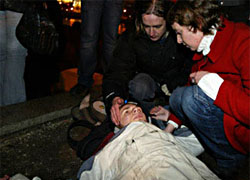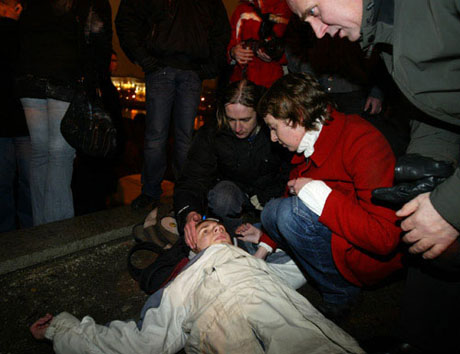Liberalisation takes its course, but nobody abolishes use of handcuffs
5- 30.01.2009, 9:30

Despite of having a legal determent, an activist of the “Young Front” Zmitser Khvedaruk has been found fit for military service and sent to serve 10-day arrest in prison in Akrestsin Street. After the arrest he can be sent right into the military unit.
As we have informed, Zmitser Khvedaruk was detained on January 28 in the flat of his parents in Minsk by people in mufti. Zmitser’s friend, taking video of the detention, was beaten up by people in mufti, his camera was broken. Zmitser was taken to a military enlistment office, though he is a full time student of Biblical Theological college and has a determent.
After that, policemen guarded the guy from the military enlistment office to the Pershamaiski district police department. He was said he must be arrested for 10 days. Last year, Zmitser was detained for celebration of expansion of the European Union on May 1. Many oppositionists were arrested, but Khvedaruk was set free and tried in absentia for participation in an authorized street action.
On the evening of the same day, Khvedaruk was guarded to the special detention facility on Akrestsin Street for a 10-day arrest. But on January 29 Zmitser Khvedaruk was taken from the detention centre into the policlinic No. 14 in Minsk to pass analysis necessary for a medical commission in the military enlistment office.
The young guy was in the hospital for the whole day. KGB officers were standing near the doctor's consulting room. They didn’t allow anyone to enter except doctors. After examination doctors gave the young man a conclusion that he is fit for military service.
After the medical examination Zmitser Khvedaruk was taken to the military enlistment office again, but the next place where he was taken was not a military unit but the same detention facility where the oppositionist was to serve 10 days of arrest.
As we have informed, beside that, on January 28 young leaders Franak Vyachorka and Ivan Shyla were forcibly seized and sent to the army.
Franak Vyachorka was seized by people in mufti right in the street. He was beaten, handcuffed and guarded to the radio-technical brigade in Baranavichy. Franak had a determent due to a recent eye surgery and problems with health. The oppositionist was found not physically qualified for military service, but he was forcibly placed to the military hospital to pass additional medical board. On January 16 he was detained in the ward of the military hospital and taken to the military enlistment office. The oppositionist appealed against the actions of military enlistment office representatives. However, the trial was held in absentia, Franak’s lawyer wasn’t informed about the date of the trial. The activist was found able-bodied for military service. On the next day the oppositionist was seized in the street and guarded to the military unit.
One of the leaders of the “Young Front” Ivan Shyla was detained at home in Salihorsk. Yesterday the oppositionist was taken to the village of Mezhytsy, Lepel district Vitsebsk region for service in the 29th air defence missile brigade.
Earlier Ivan wasn’t certified as fit for military service, but on January 28 late in the evening some “expedited” medical board was called, and they found him “fit for military service”. The activist went on hunger strike for the period until his appeal against the actions of the military men and military doctors is considered. As said by Ivan, people in mufti were giving orders to them.
“It is most likely that these actions are deliberate. The regime has understood the difference between political prisoners recognized by the West and politically motivated crackdown in general. There are very many different mechanisms to show people that they are doing things which are undesirable from the point of view of the regime.
At the same time, these examples are not so easy to be proved to the world community. It’s true, human rights watchdogs may think these are political repressions. But for the European officials who are to make a decision to extend sanctions against Belarus or not, the situation would be not so clear. These people are not behind the bars, and compulsory military service exists in Belarus. And there will be very many details in this case, and to going into these details would be rather difficult for the European officials.
By the way, they are hard to grasp for common Belarusians too, that is why the mechanism of the repressive machine works so smoothly. The news gets through being combined with negative rumours and gossip for the audience for which this message had been intended. For everybody else the situation remains difficult to understand. In any individual case many questions arise: whether the medical board has done everything right, whether the person has a right for determent and so on. This work of the repressive machine, this “new mode” is the example of “liberalisation” observed by us now,” said a political analyst Pauluk Bykouski in an interview to “Radio Svaboda”.

On the picture: Zmitser Khvedaruk was brutally beaten up by riot militia at street action “For Independent Belarus!” on December 12, 2007










